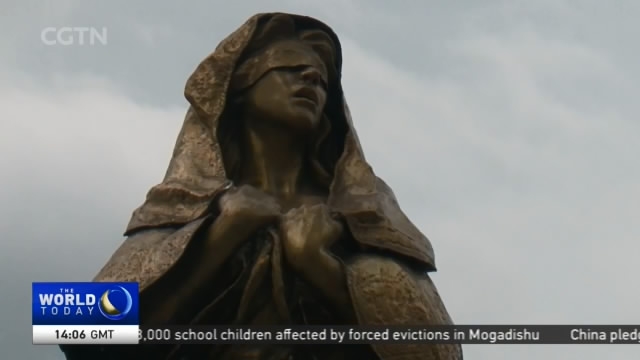
22:22, 11-Jan-2018
Philippines-Japan Ties: Comfort woman statue stirs controversy

A statue memorializing the struggle of Filipino sex slaves during the Japanese occupation in the Second World War has been erected in the Philippine capital Manila.
But the Japanese embassy lodged a protest, prompting the Philippines' foreign affairs department to question how and why the statue was allowed by the city government. CGTN's Barnaby Lo reports.
It has been decades. Most of them are dead, the living too old and weak to march the streets. But those who can, continue to fight. During the Second World War, Filipino women were among thousands who served as sex slaves – or so-called comfort women – to Japanese soldiers. But to this day, their cry for justice has fallen on deaf ears.
JOMS SALVADOR WOMEN'S RIGHTS ACTIVIST "In 2016, when President Duterte went to Tokyo and met with Prime Minister Shinzo Abe, he promised to bring up the issue of comfort women. But that meeting ended without a word on whether they did talk about it."
BARNABY LO MANILA Ties between the Philippines and Japan have grown closer and closer in recent years, and this is true both for government to government, and people to people. But one issue remains thorny – the issue of the so-called comfort women during the Second World War.
None of the previous Philippine governments were able to do anything substantial either to help Filipino comfort women get the formal apology they've been demanding. The closest the women have come to recognition of their suffering is through this statue, unveiled only last month.
JOMS SALVADOR WOMEN'S RIGHTS ACTIVIST "It's significant because in the absence of a government taking steps to pursue justice for the women, there are now private individuals who've stepped up to memorialize their experiences and struggles."
But the statue is in danger of being removed. The Japanese embassy in Manila has filed a protest. This has prompted the Philippine side to question local officials. There is concern, especially in the travel industry, that a decision to keep it erected could hurt the Philippines' economy. But activists who've been supporting Filipino comfort women say it should be viewed as an eye-opener instead.
ARLENE BROSAS CONGRESSWOMAN "We are not condemning the present generation of Japanese but if they're visiting the Philippines, then they should also learn about their history."
The usually outspoken Philippine President Rodrigo Duterte, whose love for Japan isn't a secret, has so far kept silent about the issue. So for now the fate of the statue is unknown, just as these women's quest for justice remains elusive. Barnaby Lo, CGTN, Manila.

SITEMAP
Copyright © 2018 CGTN. Beijing ICP prepared NO.16065310-3
Copyright © 2018 CGTN. Beijing ICP prepared NO.16065310-3